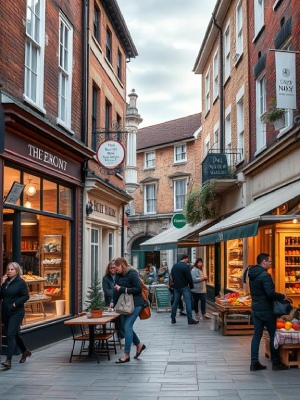
Community Efforts to Help Local Businesses
Many people are taking measures to help local businesses survive the economic fallout, with numerous initiatives across the UK. Such projects come in the form of grassroots initiatives as well as government-funded programs.
Shop Local Campaigns

In the UK, meanwhile, one of the biggest movements has been the "Shop Local" campaign that urges residents to spend money at independent retailers instead of large multinationals. Campaigns like Totally Locally and Indie Week have emerged, featuring promotional events, discounts, and business collaborations to encourage local shopping.
At the height of the COVID-19 pandemic, many communities initiated digital campaigns encouraging consumers to patronize neighbourhood merchants, restaurants and service providers. This sentiment was mirrored on social media with movements such as #SupportLocal and #BuyBritish multiplying, allowing some businesses to weather the storm.
Community-Owned Businesses and Co-operatives
Communities can also support local businesses via cooperative business models. Community-owned businesses, where residents buy collectively-owned businesses that would otherwise close, like The Bell Inn in Bath or The Bevy Pub in Brighton. Such initiatives not only ensure that essential services are accessible, but also enable residents to be invested in their local economy.
Through cooperatives, ethics in business is also promoted. The Cooperative Group — one of the UK's biggest mutual enterprises — remains a strong advocate of community-focused projects as well as fair wages, sustainable sourcing, and responsible trading.
Local Markets and Pop-Up Shops

They're on the rise | Traditional markets and pop-up shops have gained a new wave of popularity because consumers want to buy directly from artisans and producers in their local community. Farmers' markets, craft fairs and seasonal pop-up events give small businesses a way to get in front of consumers without bearing the high costs of permanent retail space.
Initiatives like Love Your Local Market, with support from the National Association of British Market Authorities (NABMA), offer funding and training to future market traders, helping them on their way. Some councils have also turned empty high street shops into temporary sites for small businesses to experiment before taking on lengthy leases.
Digital Platforms and Local Online Marketplaces
E-commerce has created new opportunities for local businesses to connect with larger audiences. But competing with major online retailers is tough. Local e-Sourced, ShopAppy, and Click It Local are just some of the community-powered hubs that emerged in response, enabling independent business owners to sell products online.
These platforms serve as online marketplaces for local businesses to list their products and, in turn, take advantage of the pooled logistics and marketing. These initiatives have allowed small businesses to stay afloat in a rapidly digitalized world by providing easy access for consumers to shop locally online.
Business Mentorship and Training Programs

Understanding that financing alone is insufficient, local communities have also poured funds into mentoring and training local entrepreneurs. The Prince's Trust, Enterprise Nation and Small Business Britain, for example, are all organizations that provide advice, funding, and workshops for small businesses to weather challenges and grow.
Business Improvement Districts (BIDs) have been established by a number of local councils whereby businesses within a specific area pay into a fund, which is then used for marketing, training and infrastructure improvements. Such initiatives also improve the business environment, making it easier for SMEs to thrive.


